 BUY NOW AmazonUK AmazonUS |
Irving Fazola My Inspiration
|
Irving Fazola (clarinet) with various bands
1. My Inspiration
w. Bob Crosby & His Orchestra
(rec. October 1938)
2. Song of the Islands
w. The Dean & His Kids
3. Jimtown Blues
w. The Rhythm Wreckers
(rec. 1936)
4. Alice Blue Gown
w. Sharky Bonano & His Sharks of Rhythm
(rec. 1936)
5. High Society
w. Seger Ellis & His Choirs of Brass Orchestra
(rec. 1936)
6. Shivery Stomp
w. The Musical Maniacs
(rec. 1937)
7. Down By the Old Mill Stream
w. Glenn Miller & His Orchestra
(rec. 1937)
8. Pagan Love Song
w. Glenn Miller & His Orchestra
(rec. 1937)
9. Humoresque
w. Bob Crosby & His Orchestra
(rec. 1937)
10. The Skaters’ Waltz in Swingtime
w. Bob Crosby & His Bob Cats
(rec. 1939)
11.Hindustan
w. Jess Stacy & his Orchestra
(rec. 1939)
12. Mournin’ Blues
w. Jess Stacy & his Orchestra
(rec. 1939)
13. Breeze, Blow My Baby Back To Me
w. Bob Crosby & His Bob Cats
(rec. 1939)
14. Clarinet Blues
w. Bob Crosby & His Bob Cats
(rec. 1939)
15. Spain
w. Bob Crosby & His Orchestra
(rec. 1940)
16. Sympathy
w. Bob Crosby & His Orchestra
(rec. 1940)
17. Speakeasy
w. Bob Crosby & His Orchestra
(rec. 1940)
18. Can’t We Be Friends?
w. Muggsy Spanier & His Orchestra
(rec. 1942)
19. Hesitating Blues
w. Muggsy Spanier & His Ragtimers
(rec. 1942)
20. Someday, Sweetheart
21. Sweet Lorraine
22. Mostly Faz
23. Jazz Me Blues
24. Ostrich Walk
25. Bluin’ the Blues
26. Farewell Blues
[20-26: Irving Fazola & His Ragtimers
(rec. October 1945 & October 1946)]
Collective personnel includes:
Billy Butterfield, Shorty Sherock, Harry James, Sharkey Bonano, Pee Wee Erwin, Mugsy Spanier (trumpet, cornet), Glenn Miller, Santo Pecora, Warren Smith, Ray Conniff, Les Jenkins (trombone), Matty Matlock, Eddie Miller, Jerry Jerome, Benny Goodman (reeds), Bob Zurke, Freddie Slack, Clyde Hart, Jess Stacy, Dave Bowman (piano), Nappy Lamare, Lloyd Rainer, Carmen Mastren (guitar) Bob Haggart, Thurman Teague, Sid Weiss (bass), Ray Bauduc, Ben Pollack (drums).
Given a somewhat different personality, Irving Fazola could surely have become one of the stars of Swing/Dixieland jazz, being a quite brilliant clarinetist. However, he wasn’t highly regarded (except amongst his fellow musicians) while alive, and since his early death he has become a somewhat forgotten figure; his name is absent from a surprising number of jazz histories and reference works. Fazola was, from all accounts, a rather difficult and somewhat coarse man. He was obese and quick to fly into a rage; he was in the grip of his lusts for drink, food, sex and jazz. In conversation, he was as likely to reply by breaking wind as by speaking. In his booklet notes to this album, Ray Crick retells one representative story: “He once became stuck in an armchair after eating a huge pile of hamburgers. When [concert] time approached, an ambulance had to be called and Faz (chair and all) was transported to the hall and left on the stage – the audience seemed unconcerned that Faz never stood up for his solos. In the interval pianist Joe Sullivan and trombonist Munn Ware eventually managed to prise him loose. Asked whether he wanted anything, he requested more hamburgers”!
Not surprisingly his death, at the age of 36, came as a result of high blood pressure and cirrhosis of the liver. Though he could often play with impressive delicacy and tenderness, such characteristics were at odds with his social presence. Bob Haggart observed that Fazola “could turn the air blue with his [constant] swearing”. Faz’s given name was Irving Henry Prestopnik and his soubriquet was apparently derived from the nickname ‘Fah-so-la’ bestowed by Louis Prima (one of the first bandleaders Faz worked with in his native New Orleans) with reference to the classical training Prestopnik had received as a boy. In fact it was the fusion of that classical grounding (the young Prestopnik studied both piano and clarinet) with the New Orleans tradition of hot clarinet (running from Alphones Picou through such figures as Johnny Dodds and Jimmie Noone of whom Fazola often reminds one) which gave Fazola’s playing its character. It is easy to agree with Barry Ulanov’s judgement that, in some of his work at least, Fazola embodied “the most polished concept of the New Orleans reed tradition”.
Most selections from a jazz musician’s recorded work which proclaim that an album contains that artist’s “very best” or “his finest recordings” need to be treated with a certain suspicion. But this collection, which carries the subtitle “His 26 finest”, really does give us perhaps as good a collection of Fazola’s work as could be assembled on a single CD. It contains such indisputably classic cuts as ‘Spain’, ‘My Inspiration’, ‘High Society’ and ‘Mournin’ Blues’. The last seven tracks on the album are not of the same high standard as the rest, but are of real interest as some of the very few examples of Fazola as a band leader. Irving Fazola’s ‘Ragtimers’ as the band was named, was made up of local New Orleans musicians of no great distinction (they include trumpeters Tony Dalmado and Abbie Brunies (a partial exception to my strictures), trombonist Julian Lane, pianist Pete Laudeman and a bassist and drummers of no distinction at all). But even with this largely inferior support, Fazola continues to produce attractive work (notably on ‘Sweet Lorraine’).
Elsewhere on this album, however, Fazola is in pretty distinguished company and yet time and again he stands out. An incidental treat, however, is the fine playing of such as Billy Butterfield, Eddie Miller, Harry James and Jess Stacy. All in all, a valuable tribute to a seriously underrated jazzman.
Glyn Pursglove